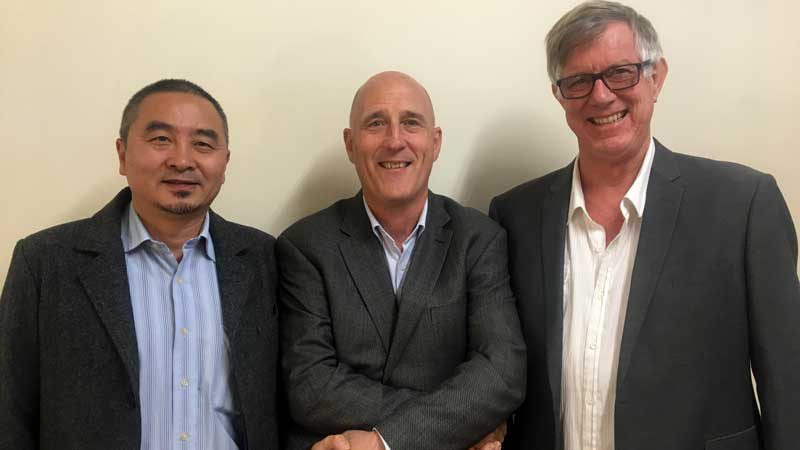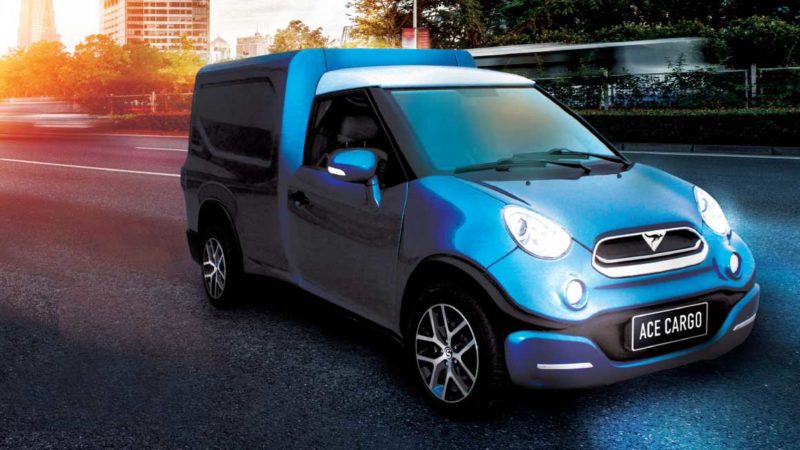Australian electric vehicle developer ACE-EV has sealed a partnership with Adelaide truck body maker Aldom, that will mark the beginning of a light commercial and passenger electric vehicle industry in Australia.
Under the landmark agreement with Aldom Motor Body Builders, who have over 40 years experience in building vehicle bodies for the commercial transport industry, assembly of ACE-EV’s Cargo commercial electric vehicle will commence starting from the first quarter of 2020.
ACE-EV boss Greg McGarvie says the deal with Aldom brings extensive vehicle body manufacturing experience and related capabilities, as well as existing factory floorspace – the final piece in the puzzle for the Australian startup.
“What [Aldom] is doing is pretty well supporting everything we need in terms of builder and assembler, as well as distribution and warranty and servicing,” McGarvie tells The Driven.
“It’s very exciting,” says Aldom CEO Mark Haig, who will hire 15-20 new staff to create the new assembly line. “Work wise for us it will be very good, it will be a whole new team.”
Haig says the company aims at first to work towards making 10 cars a day at its existing facility. “Once we get to 10 cars a week we’re then looking at getting into a purpose built premise or adapting an existing one.”
To begin with, the molded carbon-fibre reinforced body parts designed in conjunction with Taiwanese and German partners Dr Charles Kung, previously chief engineer for Taiwan’s high speed train, and Gerhard Kurr, formerly of German Binz, will be brought in from overseas to be assembled in Adelaide.
A very limited run will make up the first manufacturing line, order for which McGarvie expects they will have no trouble achieving.
“We’re taking 100 orders for vehicles for the first tranche, by the end of 2019 the books will be closed and they’ll be built in the first quarter of next year.”
“As we progress, and the appetite looks like it’s there…we’ll go to full manufacturing.”

The next stage will be to bring the molding process to Australia, with a view to developing a global right-hand drive market for which ACE-EV have exclusive rights.
But first, as with all new technology ventures, funding is needed.
“As soon as we’ve got $130 million for full manufacturing, then we’ll be molding everything here,” says McGarvie. “That’s the total to set up the entire operation up.”
Creating an auto company from scratch is no minor task, a fact that Tesla CEO and founder Elon Musk can surely attest.
The deal with Aldom will ease the scale of that task, McGarvie says: “Having Mark’s existing facility takes a lot of the risk out of it.”
While the percentage of components in the vehicle builds will at first comprise around 25% Australian-made content, McGarvie says that once full manufacturing in Australia revs up, the aim is for 50% Australian-made content.
“That will make us more Australian than Holden or Ford ever were,” he says.
“Brakes, shock absorbers and interior components can be sourced here as they were for Holden and Mitsubishi,” says Haig.
Next steps will be to have the ACE-EV Cargo – the first of which was assembled and unveiled in Sydney in March – passed through Australia’s crash testing, Australian design regulations and ANCAP ratings.
McGarvie says that as the ACE-EV Cargo has passed extensive crash testing in China (where strict European standards are used to enable sale in the European market), he has no concerns about passing the same in Australia.
“The whole [EV] technology is safer than a fossil fuel vehicle anyway, with a low centre of gravity, less roll-over capability, plus the cage, which is carbon fibre, is 2-3 times stronger than steel,” he says.
As noted last week by The Driven, ACE-EV also intend to develop an Australian R&D facility, and hopes, depending on this weekend’s election outcome, to leverage a $57 million EV research and development fund announced by Labor shadow minister for Innovation, Industry, Science and Research Kim Carr last week.
Once manufacture begins next year, ACE-EV will join the likes of Victorian-based SEA Electric in creating a new automotive industry in Australia with a zero emissions focus, and global ambition.
SEA Electric, who make electric trucks by integrating their patented electric drivetrain into Ford stripped chassis truck bodies, have been getting noticed overseas with several orders taken recently in the US while demonstrating their vehicles at a truck show.
On Tuesday, another Australian company has announced its intention to throw a hat in the electric vehicle ring, with bus builder Volgren saying it will begin making a prototype for a pure electric drivetrain bus next month.

Bridie Schmidt is associate editor for The Driven, sister site of Renew Economy. She has been writing about electric vehicles since 2018, and has a keen interest in the role that zero-emissions transport has to play in sustainability. She has participated in podcasts such as Download This Show with Marc Fennell and Shirtloads of Science with Karl Kruszelnicki and is co-organiser of the Northern Rivers Electric Vehicle Forum. Bridie also owns a Tesla Model Y and has it available for hire on evee.com.au.

